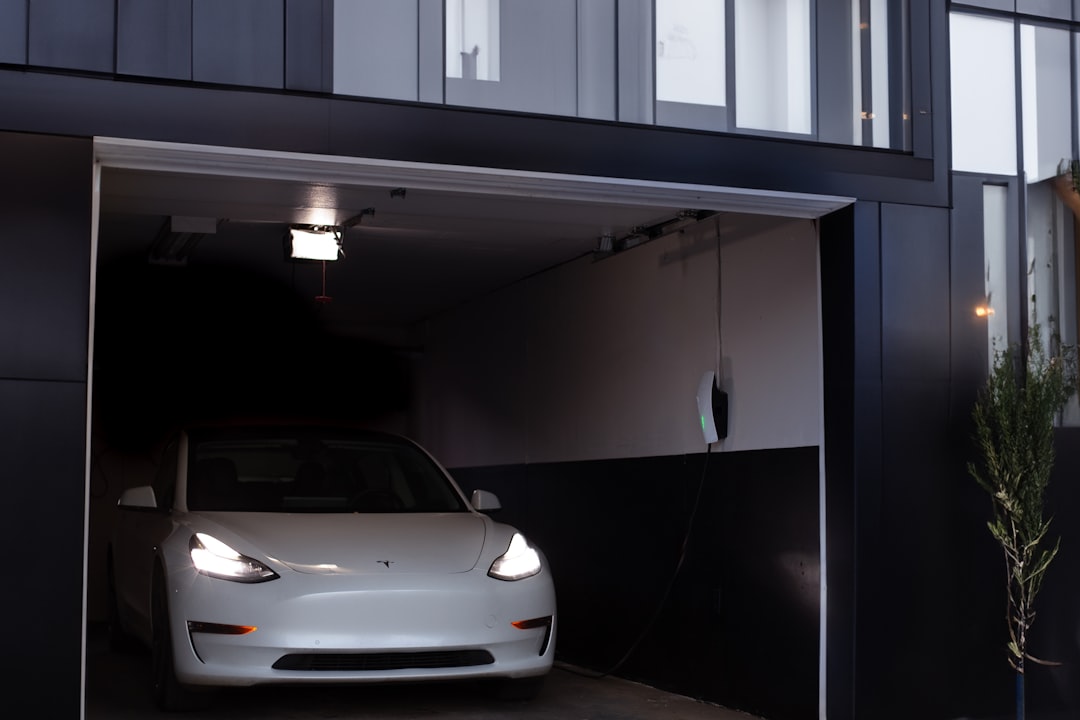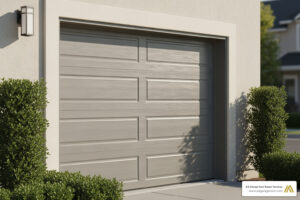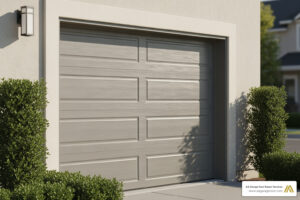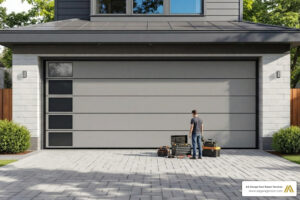Why DIY Electric Garage Door Repairs Can Save You Time and Money
An electric garage door offers incredible convenience, but when it malfunctions, it can be a major source of frustration. Many homeowners in St. Paul and the Twin Cities find themselves stuck, but the good news is that many common issues can be fixed with a little know-how. This guide will walk you through simple troubleshooting steps for electric garage door repairs, empowering you to handle minor fixes yourself. For more complex issues, you can always count on our team for reliable garage door services. We’ll help you identify when a DIY fix is appropriate and when it’s time to call in the experts.
Most Common Electric Garage Door Problems:
- Opener won’t respond: Power, remote, or switch issues.
- Door reverses unexpectedly: Sensor alignment or obstruction problems.
- Motor runs but door doesn’t move: Disconnected trolley or broken drive mechanism.
- Strange noises: Indicates a need for lubrication or worn parts.
- Slow or erratic movement: Signals track issues or worn components.
Quick Safety Check: Always disconnect power before attempting any repairs. Never attempt to fix springs or cables yourself, as they are under high tension and extremely dangerous. This guide will walk you through the most common problems and show you which repairs you can safely handle yourself—and which ones require professional expertise.
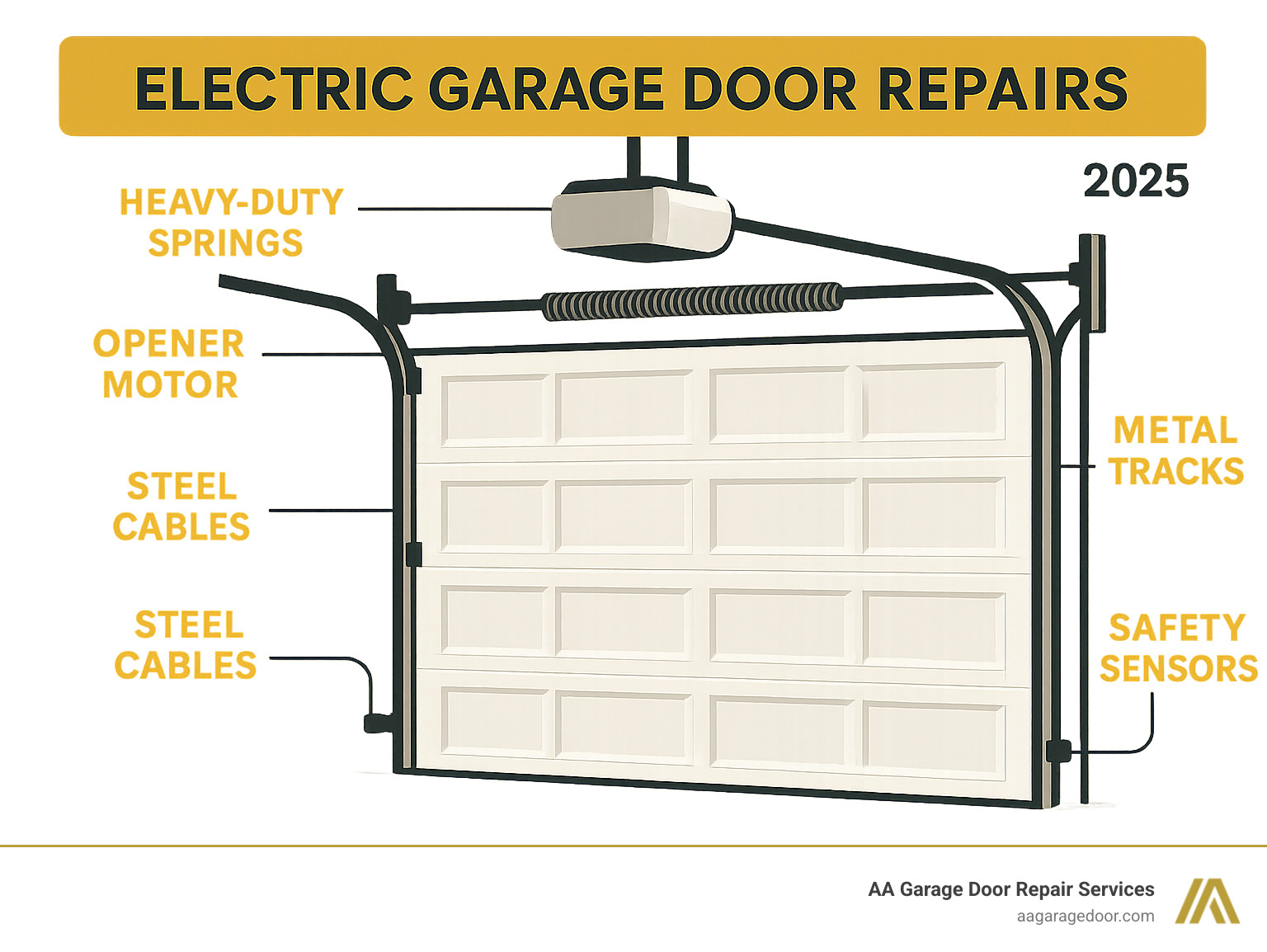
Electric garage door repairs terms to remember:
Telltale Signs Your Electric Garage Door Needs Attention
Your garage door has a way of communicating—you just need to know how to listen. It usually gives fair warning before it completely quits. Recognizing these early signs can save you from being stranded and prevent minor issues from turning into expensive electric garage door repairs.
Catching these hints early is key before they become full-blown problems that require professional garage door opener repair.

Strange Noises
If your garage door suddenly sounds like a horror movie soundtrack, that’s your first clue. A well-maintained door should operate with a gentle hum. Grinding or squeaking are common culprits. Squeaking usually means the door needs lubrication, while grinding often signals worn rollers or bearings. Don’t ignore these sounds; what starts as a minor squeak can escalate into damaged tracks or a stressed opener motor.
Slow or Erratic Movement
Does your door move slowly, stop halfway, or seem to struggle? These are red flags. Slow movement often points to spring issues. When springs wear out, your opener works overtime, leading to premature motor failure. Erratic movement might indicate problems with tracks, rollers, or the opener’s internal mechanisms, putting undue stress on the system.
Door Reversing Unexpectedly
It’s frustrating when your door closes partway and then reverses. This behavior is usually your safety system doing its job, albeit incorrectly. The safety sensors are designed to prevent the door from closing on objects. When they’re misaligned, dirty, or malfunctioning, they can trigger false alarms.
Remote or Wall Switch Not Working
When you press the button and get no response, it’s often an easy fix. Dead remote batteries, tripped circuit breakers, or remotes that need reprogramming are common culprits. Your wall switch might also be in “vacation mode,” a security feature that disables remote operation.
Here are the most common warning signs to watch for:
- Unusual noises (grinding, squeaking, rattling)
- Slow or jerky movement
- Door reversing without cause
- Unresponsive controls
- Visible wear on cables or springs
- Door opening or closing unevenly
For a deeper dive, check out our guides on 10 Signs You Need to Get Your Garage Door Serviced and 10 Reasons Your Garage Door Isn’t Working Properly.
Common Problems & DIY Solutions for Electric Garage Door Repairs
Now that you know what to look for, let’s tackle some of the most common electric garage door repairs you can safely handle. Many issues that seem complex are actually straightforward fixes. The key is knowing where to start and when to stop.
Prioritize safety: always disconnect power to your opener before starting. Never work on springs or cables—these components are under extreme tension and require professional handling. For complex issues, professional garage door opener repair can prevent injury and costly mistakes.
The Opener Won’t Respond at All
This is often the easiest problem to solve. Start with a power supply check. Ensure the opener is plugged in, and check your electrical panel for a tripped circuit breaker. Many garages have GFCI outlets with reset buttons; press the reset button firmly if it has popped out.
Remote control batteries are a classic culprit. If new batteries don’t work, the remote may need reprogramming. Check your owner’s manual for steps, which usually involve a “learn” button on the motor unit. Also, check if your wall switch is in lock mode, a feature that disables remote access for security.
The Door Reverses Before or After Hitting the Floor
This safety feature can be an annoyance when it malfunctions. The most common cause is safety sensor misalignment. These photo-eye sensors create an invisible beam; if they aren’t aligned, the system thinks something is blocking the path. Look for the small LED lights on each sensor—if one is off or blinking, gently adjust them until both lights are solid.
Cleaning the sensor lenses with a soft cloth can also solve the problem. Also, check for obstructions in the door’s path. If the door stops at the wrong height, the close-limit switches may need a slight adjustment, usually via screws or dials on the opener. For more on sensor issues, see our guide on Common Reasons for Garage Door Sensor Troubles.
The Motor Runs, But the Door Doesn’t Move
You hear the opener working, but the door isn’t moving. This usually points to a mechanical disconnect. The most likely cause is a disconnected trolley. The emergency release cord (usually red) disengages the door for manual operation. Pull the cord toward the motor to re-engage it, then run the opener to reconnect.
More serious issues include stripped gears or sprockets inside the motor unit or a broken chain or belt. These problems typically require professional repair, as they involve opening the motor housing or handling the drive mechanism. To better understand your system, learn about the 4 Differences Between Chain Drive and Belt Drive Garage Door Openers.
Safety First: Essential Precautions for DIY Repairs
We’re all for empowering homeowners to tackle minor electric garage door repairs, but safety is paramount. Garage doors are heavy, complex machines with components under extreme tension. Ignoring safety precautions can lead to serious injury.

Disconnecting Power
Before you touch anything electrical, unplug the garage door opener from the power outlet. If it’s hardwired, flip the dedicated circuit breaker at your home’s electrical panel. This single step prevents the door from accidentally activating while you’re working on it.
Understanding High-Tension Components
Your garage door weighs 150 to 400 pounds. The springs and cables do the heavy lifting, and they are under incredible tension. When springs break, they release this energy explosively. The cables are equally dangerous if they snap or fray.
Avoiding Springs & Cables
Never, ever attempt to repair, adjust, or replace garage door springs or cables yourself. This cannot be emphasized enough. These components should only be handled by trained professionals with specialized tools. If you notice a broken spring or frayed cables, stop using the door immediately and call for professional help.
Using the Right Tools
For safe DIY repairs, you’ll need basic tools: a screwdriver, pliers, an adjustable wrench, and a sturdy step ladder. Don’t balance on a wobbly chair. Always wear safety glasses and consider work gloves. If you find yourself forcing a tool, it’s a cue to step back and call a professional.
For comprehensive safety guidelines, we highly recommend reviewing this guide to garage door safety from DASMA. It’s an excellent resource for every homeowner.
When to Call a Professional for Electric Garage Door Repairs
There’s a real line between a satisfying DIY fix and a problem that needs a professional. When it comes to electric garage door repairs, knowing when to call for backup keeps you safe and ensures the job is done right. Trying to fix complex issues yourself can turn a simple problem into an expensive nightmare.
Complex Issues Beyond DIY Repairs
Some problems are more serious than they appear. Broken torsion springs top this list. If you see a gap in the spring above your door, it has failed. These springs are under enough tension to cause serious injury if handled improperly.
Frayed or broken cables are equally dangerous, as they work with the springs to lift the door. When they snap, the door can become unpredictable and hazardous. Similarly, if your door comes off its tracks, don’t force it back. This usually signals deeper issues with rollers or alignment. Forcing it can cause major damage.
Even damaged door panels require precise alignment and balancing to prevent further issues. Professional replacement is essential for safety and proper function, especially since springs have an average lifespan of 7-10 years.
Understanding the Cost of Professional Repairs
Cost is often a concern, but professional help can be a wise investment. Average repair costs run $150-$300, while opener-specific repairs are typically $100-$300. The repair vs. replacement analysis is key. Most openers last 10-15 years. If your 12-year-old opener needs a $250 repair, a new unit for around $400 with modern features and a warranty might be a better long-term value.
Professional warranties also add value. We offer a 5-year guarantee on repair parts and a minimum 10-year guarantee on new installation parts, providing peace of mind that DIY repairs can’t match.
The Benefits of Professional Service
Professionals bring expertise, specialized tools, and a commitment to safety. We can spot potential issues before they become emergencies and have the right equipment for the job, like winding bars for springs. We provide long-term solutions by addressing the root cause of a problem, ensuring your system works reliably for years.
For expert help with your opener issues, check out our Garage Door Opener Repair services. We work with trusted brands like Chamberlain, Genie, and Craftsman to ensure seamless operation.
Proactive Maintenance to Prevent Future Problems
Think of your garage door like your car—regular maintenance keeps it running smoothly and prevents breakdowns. When it comes to electric garage door repairs, the best repair is the one you never have to make. A little proactive care extends your door’s lifespan and saves you money.

Annual Professional Inspection
An annual professional inspection catches small issues before they become expensive problems. A technician will inspect all moving parts—springs, cables, rollers, and tracks—for wear. They will also test safety mechanisms like the auto-reverse feature and photo-eye sensors. Proper lubrication and tightening of hardware are also part of the service. Regular maintenance can extend your opener’s life by up to 5 years and your springs’ lifespan by up to 3 years.
Monthly DIY Checks
Between professional visits, you can perform simple monthly checks.
- Balance Test: Disconnect the opener and lift the door halfway. A balanced door should stay put. If it falls or rises, the springs need professional adjustment.
- Reversal Test: Place a 2×4 flat on the ground in the door’s path. The door should reverse upon contact. If not, call for service. Also, test the photo-eye sensors by waving your hand in front of them as the door closes; it should immediately reverse.
- Lubrication: Use a silicone-based lubricant on all moving metal parts like hinges, rollers, and springs. Avoid WD-40, as it can attract dirt. This simple step prevents noise and reduces wear.
Smart Garage Door Technology
Modern technology makes maintenance easier. Smart garage door openers let you monitor and control your door from your smartphone, adding convenience and security. You can find more about the 4 Benefits of Making Your Garage Door Smart.
Battery backups are another great feature, allowing your opener to work during a power outage. These batteries need occasional replacement to remain reliable. Our Garage Door Opener Battery guide has all the details.
Frequently Asked Questions about Electric Garage Door Repair
After more than 23 years of providing electric garage door repairs in the Twin Cities, we’ve heard just about every question imaginable. Here are the most common ones.
How often should I have my electric garage door serviced?
Your garage door should be serviced by a professional annually, while you perform monthly DIY safety checks. This isn’t just a recommendation; it’s based on decades of experience. Regular maintenance can extend the life of your door and opener by several years, saving you from costly emergency repairs down the road.
Why does my garage door open by itself?
This “phantom operation” can be unsettling but isn’t supernatural. It’s usually caused by one of three things: radio frequency interference from nearby devices (like baby monitors), a remote with a stuck button, or a faulty circuit board in the opener itself. Most of these issues have simple solutions. For detailed troubleshooting, see our guide on Why Your Garage Door Opens or Closes by Itself.
Is it cheaper to repair or replace a garage door opener?
The answer depends on the opener’s age and the problem. If your opener is over 10-15 years old and needs a major repair (like a new motor or circuit board), replacement is often more cost-effective. A new opener provides modern features, better security, and a fresh warranty. For newer units with minor issues like misaligned sensors or broken gears, a repair is typically the smarter financial choice. We will always provide a straight assessment to help you make the best decision for your situation.
Conclusion: Keep Your Garage Door Running Smoothly
Congratulations! You now have the knowledge to handle many common electric garage door repairs. There’s great satisfaction in fixing something yourself and saving money on service calls.
The key is knowing when to roll up your sleeves and when to step back. Simple fixes like replacing remote batteries or cleaning sensor lenses are well within your reach. However, high-tension components like springs and cables are jobs for the pros. Your safety is always the top priority.
Regular maintenance is your secret weapon against unexpected breakdowns. Monthly checks and annual professional inspections are small investments that pay off in reliability and peace of mind.
At AA Garage Door Repair Services, we’ve been helping Twin Cities families keep their garage doors running smoothly since 2001. We love empowering homeowners with knowledge, but we’re always here when you need professional expertise. Whether it’s an emergency or a complex repair, our team is ready to help.
Need expert help? Don’t let a stubborn garage door derail your day. Call 24/7 at (651) 994-1817 for fast, transparent repairs, or explore our Garage Door Opener Repair services. Prefer prevention? Schedule your annual garage door maintenance today.

